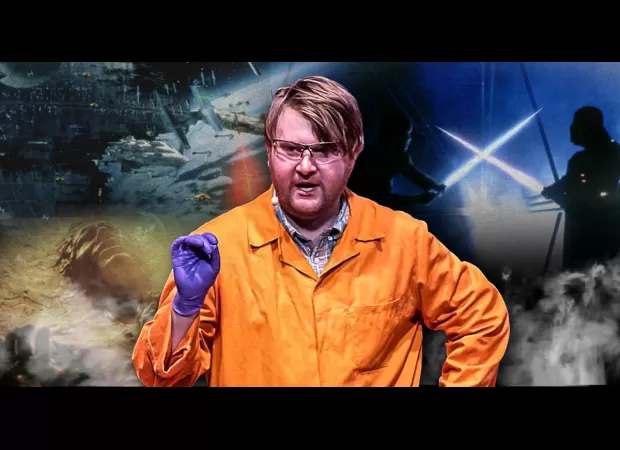Scientist uses Star Wars inspiration to create real-life "purple cannon fire" in experiment.
Prof. Baker delves into the scientific aspects of May 4 - Star Wars day.

Professor Alex Baker is a curious mind who has delved deep into the realm of possibilities presented in the Star Wars universe. While most of us view the technology in these films as light years ahead of our own, Professor Baker has embraced the challenge of exploring the real-world applications of these fictional concepts. As a dedicated fan of the franchise since his childhood, he has always been fascinated by the dazzling technology and has now set out to investigate how they can inspire and inform our understanding of science.
In his upcoming talk at The Royal Institution in Westminster, Professor Baker will showcase his hands-on experiments exploring the chemistry behind the freezing of Han Solo, the iconic lightsaber colors, and the powerful reactions that fuel star ships. He notes that the elements and compounds found in the Star Wars universe are also utilized on Earth for their explosive and combustible properties, and he is excited to share his findings with the world.
May 4th marks a significant day for Star Wars fans, as it is an informal celebration of the beloved media franchise created by filmmaker George Lucas in 1977. This year also marks the 25th anniversary of The Phantom Menace, with the blockbuster returning to select theaters across the US, UK, and Europe. As a tribute to his love for the franchise, Professor Baker will be sharing his research on this special day.
Reflecting on his early fascination with the futuristic technology in Star Wars, Professor Baker shares, "I've always thought the amazing technology and science was really cool and as a kid, I hoped and imagined that it would be possible one day." His interest in the franchise has only grown stronger over the years, and he still holds a special place in his heart for the iconic lightsabers that combine clever technology and design.
One of the most inspiring ideas that Professor Baker believes has real-world potential is the carbonite freezing plotline of Han Solo. He explains, "The ability to freeze blood, cells, or organs for longer and at lower temperatures, which colleagues and I have conducted research on, is a technology that we really need here and now to solve problems like the crisis in organ donation." He continues to hold onto the hope that one day, science fiction will become science fact, as he believes that scientists have a knack for making the previously impossible, possible.
Breaking down the galactic science into key areas, Professor Baker has explored the use of oxygen and hydrogen in rocket engines, sodium as a fuel in the Star Wars universe, and the role of nitric acid in warfare. He has also delved into the concept of cryogens, which may have inspired the iconic freezing of Han Solo. In addition, he has replicated the bright colors of lightsabers through flame tests, demonstrating how different elements produce different colors when heated.
As he prepares for his talk, Professor Baker is reminded of his childhood love for Star Wars and how it has shaped his passion for science. He shares, "I've been in love with Star Wars since watching my dad's VHS tapes of the original trilogy." His journey in exploring the science behind the franchise has only just begun, and he is excited to see where it will take him.
In the Star Wars franchise, science, technology, and human endeavor play a crucial role in the development of the universe. While Professor Baker's explorations may seem like a far-off fantasy, he is determined to continue pushing the boundaries of what is possible. As he continues to make new discoveries and share his findings with the world, he hopes to one day match the genius of Galen Walton Erso, the scientist who played a pivotal role in creating the Death Star.
If you have a story to share, Professor Baker encourages you to reach out and connect with him. He is always eager to hear from fellow fans and fellow scientists who share his love for the Star Wars universe and the endless possibilities it presents. As he continues to inspire and educate others, he hopes to spark curiosity and ignite a passion for science in the minds of future generations.
14 Views






